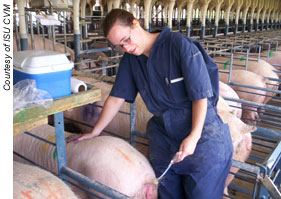Swine center planned for Iowa State
The country's first veterinary college program focused on swine health and production is now being established at ISU.
Iowa State University College of Veterinary Medicine will be the first in the United States to establish a program focused specifically on swine medicine. The plan received approval from the Iowa Board of Regents Dec. 9.

The Swine Medicine Education Center will be dedicated to providing veterinary students and practicing veterinarians from across the United States and around the world with extensive hands-on experience and education in swine health and production.
The location makes sense, given that Iowa is the nation's top pork-producing state, with thousands of operations that together raise about 30 million hogs a year.
The center plans to partner with the Audubon-Manning Veterinary Clinic, a large veterinary practice in the state that owns a pork production company and can provide access to a site housing 5,000 sows. Students will get hands-on experience at facilities owned by the clinic through education modules focusing on various stages of the pork production chain.
Specifically, students would learn to collect blood and saliva samples from pigs, evaluate deaths, and analyze pig behavior and health in short, intensive sessions, according to ISU associate professor Dr. Locke A. Karriker, who will be the center's director.
Now that the regents have approved the proposal, the next steps will be modifications to facilities to accommodate students, organization and building of the curriculum, and fundraising efforts.
"When the center is fully operational, the annual cost will be approximately $250,000, at least half of which will need to come from the pork industry," said Dr. Karriker in an ISU press release. The center is expected to accept its first students during the 2011-2012 academic year.
Dr. Pat Halbur, chair of the Department of Veterinary Diagnostic and Production Animal Medicine at Iowa State, said in the press release that veterinary education in North America is evolving toward a model in which the core curriculum is taught in each of the 28 veterinary colleges during the first three years, with students who choose to specialize having the option to go to other veterinary colleges for a portion of their clinical education during their fourth year.
"Most of the colleges of veterinary medicine, including ISU, provide outstanding clinical education in companion animal medicine; however, many of the veterinary colleges that are not in states with intensive livestock production face a challenge having enough food animal-focused faculty and access to appropriate modern production operations to provide the type of education students need," Dr. Halbur said.
The college also hopes the center will make Iowa a hub for some of the best science around the world related to pigs and pork and a destination for people who are involved in those activities, whether it's from a public health perspective, an environmental perspective, or an animal security perspective, according to the release.
The concept for a program to fulfill a specialized need in food animal veterinary education is not new. The Pew National Veterinary Education Program study, published in 1988, and the Association of American Veterinary Medical Colleges' Foresight Report, published in 2007, both called for such action.
The Centers of Emphasis program of the Department of Agriculture's National Institute of Food and Agriculture was authorized by the 2008 Farm Bill to establish regional Centers of Emphasis for specific agricultural commodities, composed of one or more colleges and universities. These centers were to provide grants to veterinary schools to create centers of emphasis in food systems veterinary medicine.
Since its authorization, both the AVMA and the AAVMC have continually sought initial funding of $15 million for Centers of Emphasis, but Congress has not allocated any funding.
Regardless, a few veterinary schools have implemented similar programs in the areas of dairy and beef production medicine and have had success. The Transitions Management Facility is an innovative public-private partnership in dairy herd health and production management led by the University of Minnesota. The Michigan State University Training Center for Dairy Professionals is another such partnership and has created opportunities for dairy-focused students in food supply veterinary medicine.